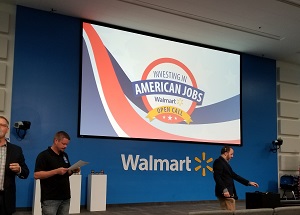Small Business Local Sourcing by Ryan Edwards
 Over the past few weeks, I have been fortunate enough to work with many small businesses in and around the Fort Worth, Texas community. I’ve spoken with many small business owners and have seen the toll the pandemic has taken on their businesses. I have also seen the great opportunities present within the small business community to strengthen this ecosystem and create a strong American middle class. The key to success going forward will be encouraging collaborative efforts amongst small businesses throughout the country to establish strong domestic supply chains and encourage the return of domestic manufacturing.
Over the past few weeks, I have been fortunate enough to work with many small businesses in and around the Fort Worth, Texas community. I’ve spoken with many small business owners and have seen the toll the pandemic has taken on their businesses. I have also seen the great opportunities present within the small business community to strengthen this ecosystem and create a strong American middle class. The key to success going forward will be encouraging collaborative efforts amongst small businesses throughout the country to establish strong domestic supply chains and encourage the return of domestic manufacturing.
No longer can we rely on parts created in foreign lands; we must bring our supply chains back to the United States. This should start in a small business environment throughout America. Restaurants and retailers should look to source locally as much as possible. Not only does the quality of ingredients and products tend to rise when you source locally, but you are also reinvesting in your own community, building relationships, and establishing strong support for your business. If we start to see the smaller mom and pop type stores and small organizations (fewer than 500 employees) begin to desire parts made in America, we can begin to open new manufacturing sites in America.
A domestic sourcing movement opens the possibility for hundreds of new manufacturing “start-ups” looking to provide for their local communities. This domestic sourcing and manufacturing wave also helps to build a strong middle class in America. We give thousands of people the opportunity to start companies and produce high-quality products for affordable prices where the money will end up in the pockets of blue-collar, American employees. The profit won’t be going to investors in multi-billion-dollar organizations or to foreign companies across the world. Dollars will begin to stay in the US and circulate through the local small business community over and over again.
Additionally, we need to see more initiatives like the one taken by MonoSol, a medium-sized water-soluble film manufacturing company, who paid for hundreds of employees to spend $70 on dinner at a few local restaurants in the LaPorte, Indiana community where their major plant is based. This allowed for the local restaurant selected that week to earn roughly $14,000 in a single day, that otherwise might never have made its way through the doors. There are thousands of companies across America that could put together an initiative like this that would substantially improve the well-being of iconic local restaurants.
American businesses, especially of small and mid-sized stature, need to look out for each other and get creative in supporting one another’s business. Only through strong, concerted efforts to invest in our communities and build local stability will we emerge past this pandemic. Another benefit of doing so is that we make our economy substantially more “pandemic-proof”. Should something like this ever to happen again, we wouldn’t be held hostage to supply chains half a world away, but rather will have all the flexibility needed to adjust and react quickly.
 Ryan Edwards is currently pursuing a Master of Business Administration degree with a Consulting Concentration and Data Analytics Certificate at Texas Christian University. He is a graduate of the University of Texas at Austin where he earned a Bachelor of Science degree in Sport Management with a minor in Business Foundations.
Ryan Edwards is currently pursuing a Master of Business Administration degree with a Consulting Concentration and Data Analytics Certificate at Texas Christian University. He is a graduate of the University of Texas at Austin where he earned a Bachelor of Science degree in Sport Management with a minor in Business Foundations.
In conjunction with his studies at TCU, Ryan is working as a business consultant with JCPenney and will serve as the President of the MBA Consulting Club for the 2020-21 academic year. He is working towards a career in consulting where he can unite his love of problem-solving and his passion for data-driven decision-making. He expects to graduate in May 2021.
Ryan’s professional experience lies primarily in the sporting industry. He has worked for a number of sporting organizations including the Dallas Cowboys, the University of Texas Men’s Basketball team, and the Texas Christian University Men’s Basketball team. He has served in marketing, operations, people management, and data analytics roles throughout his career in sports



